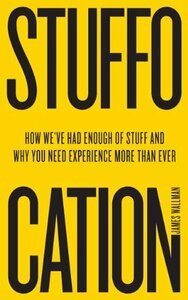Take a photo of a barcode or cover
Stuck in the middle of materialism and the extreme minimalists bloggers, many of us have no idea where we fit and what our relationship should be with our possessions. The author takes information from economists, psychologists, sociologists, and other fascinating statistics to show us where we are as a nation when it comes to stuff (and how it all came to be), and he discusses four attempts at combating the clutter and absurd amount of stuff humans accumulate: minimalism, simplicity, The Medium Chill (my personal favorite), and ultimately, experientialism (okay, I liked this one too, since it was the message of the book). Although I wasn't able to read the conclusion (the library book was due), I feel like my perspective shifted dramatically. This was an excellent read!
It's interesting how STUFF has a negative impact on my life & mood.
Really enjoyed this but did expect better when i heard about it initially.
Really enjoyed this but did expect better when i heard about it initially.
I really enjoyed this book....I knew I had too much stuff but this book definitely prompted a clear out of the loft ,the house and umpteen visits to the charity shop!My weakness is books & I literally have hundreds & take great pleasure in the look & feel of them & having them around but after reading today that it takes 78 times more water to produce a physical book than an ebook think I perhaps should curtail that habit too!All in all,was an interesting read & I enjoyed the case studies.Hopefully has given me the kick I needed to de clutter permanently.
hopeful
informative
inspiring
reflective
tense
medium-paced
I must admit I was a bit sceptical about reading this book as I don't tend to like 'self-help' books but as I started turning the pages I soon discovered this one is not it. In fact, I really enjoyed James Wallman's factual data about the rise of consumerism and trends. Some of the examples given in the book about people who've turned to minimalism/experientialism were really interesting and I could relate to.
In the end, it's a well-thought reflection on where we're going and where we maybe should be going next if we want to consume less and reduce our footprint in the environment.
Very well written and good to read.
In the end, it's a well-thought reflection on where we're going and where we maybe should be going next if we want to consume less and reduce our footprint in the environment.
Very well written and good to read.
I may have come to this book a little late. Many of the people and stories were already familiar to me, so it read a bit like a literature review. However, it was a particularly non-critical lit review that seemed to gloss over environmental degradation and poverty. So I found it a bit disappointing.
Fascinating look at the problems caused by our materialistic society and the problem of overconsumption. I'm hopeful that Wallman's trend forecast is accurate and that we are moving toward a less materialistic, more minimalist and experiential society. I've already been going that way myself for a few years, so think it would be wonderful if the Western world caught on en masse and we could work together toward fixing some of the wrongs we've done ourselves and the planet.
informative
inspiring
reflective
medium-paced
Nothing particularly earth shattering here. Reviews the arguments for materialism, the simple life, and minimalism, with a fair number of anecdotes. Plumps for something he calls experientalism, which (as he acknowledges) sounds like Facebook one-up-manship and seems to him to be at least partially a type of status-seeking. Accumulating experiences as a lifestyle feels to me oddly like parasitism.
The tone of my review may be due to an overload of books written for wistful MBAs, IT professionals, and bloggers who are tired of working in the corporate world.
The tone of my review may be due to an overload of books written for wistful MBAs, IT professionals, and bloggers who are tired of working in the corporate world.






